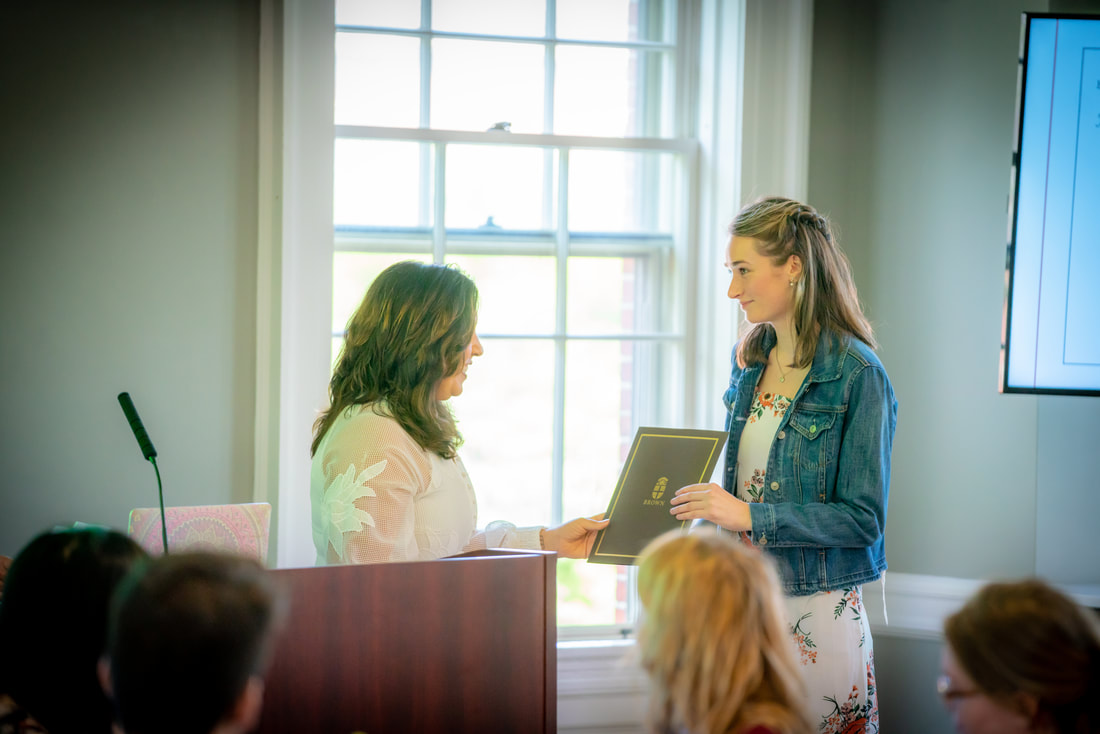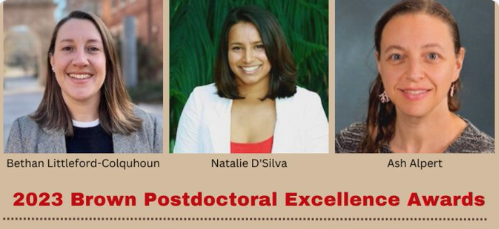|
The paper led by Brian Gill on individual-level tracking of elephant diets -- Foraging History of Individual Elephants Using DNA Metabarcoding -- was just published by Royal Society Open Science. We are very proud of this paper, which revisits a set of classic studies on seasonal diet switching by elephants using stable isotopes in hair that were led by coauthors Thure Cerling and George Wittemeyer. The work was made possible with support in the field from Save the Elephants and with the botanical expertise of coauthor Paul Musili from the National Museums of Kenya.
The paper was accompanied by a great summary by Corrie Pikul and featured on the Brown University homepage: Similar to Humans, Elephants Vary What they Eat for Dinner. The paper also attracted attention in the media, including interviews on BBC Television and Times Radio. Some nice coverage of the study was also provided by BBC (with hilarious photos), Newsweek, ZME Science, and The Times.
0 Comments
Congratulations to Beth for having her CRISPR-based barcoding paper published at Molecular Ecology Resources! The paper is available ahead of print on the publisher's website and we will post a PDF to our lab's publications page. Our original summary based on her preprint in June is still available in the text that follows. Beth just posted a much-anticipated BioRxiv preprint describing our new efforts to repurpose CRISPR technology in ways that might help overcome persistent drawbacks to PCR and other targeted enrichment strategies in molecular ecology (doi: 10.1101/2023.06.30.547247v1). We show that we can obtain highly accurate plant DNA barcodes and assemble entire chloroplast genomes. These advances could help with species identification, discovery, and the construction of DNA reference libraries for use in a variety of applications. Moreover, we show incredible accuracy when it comes to estimating the relative abundance of DNA from a mixture of species compared to typical PCR-based methods for DNA metabarcoding.
We hope the experimental methods will be of interest and that folks working in the field will see the great potential. Once scalable, these advantages could really transform the quality and completeness of many projects that we do in the lab -- and the kinds of project we know a lot of folks are out there trying to do around the world as well! The approach was noted to be a potentially 'high risk / high reward' of the NSF CAREER award that supported our work. We'll update once it is peer-reviewed and published. An exciting paper from the lab on lizard behavior, let by (former) undergraduate all-star Thomas Patti, appears today in Biological Journal of the Linnean Society. The "Bite and Seek" paper focuses on the exploratory behaviors and bite force of the Podarcis lizard colony that we had on campus. Thomas and the team tested an extensive series of hypotheses about the relationship between behaviors observed in populations of this non-native lizard species and the recency of population establishment. All else equal, propensity for exploration might be expected to facilitate the establishment of new populations -- lizards have to explore at least a little to get somewhere new -- and thus recently founded populations should comprise groups of explorers. Not so in nature, Thomas reports, and this requires us to take a more nuanced view of behavioral 'syndromes' as sets of traits and behaviors that may be associated with invasion potential and success in non-native species. Great work Thomas, Colin, Andy, and Caroline!
Senior all-star Caroline Dressler won the 2023 Kidwell Prize! This is the top senior prize in our area of biology. Caroline was recognized for outstanding academics, a top-notch Honors thesis, consistent leadership at Brown, and a community-minded commitment to education. It was an honor to contribute to her journey -- we look forward to publishing more papers together and following her journey for years to come. Congrats, Caroline!
Congratulations to Andy Luo for a 2023 Fulbright Scholarship! On top of completing his Honors thesis and preparing to graduate, Andy can look forward to joining the amazing community of Fulbright scholars. During his program, Andy plans to teach English in Taiwan -- an amazing opportunity for a top-notch student.
Brown is typically among the top Fulbright-producing universities and Andy is the third Honors student from the lab to earn one. Amazing! Congratulations to Robert Ang'ila for publishing a paper based on his Masters research in African Journal of Ecology! Robert's paper reports on spatial associations between the abundance and diversity of wildlife and understory plant communities across the massive CTFS-ForestGEO plot at Mpala Research Centre in Kenya. The work highlights how fine-scale variation in soil and topography can shape plant-herbivore interaction networks that play out over much broader scales. Great work, Robert!
Courtney has successfully defended her Ph.D. dissertation! The dissertation is a complication of manuscripts that barely scratches the surface of the breadth of Courtney's wide-raging interests in mammalogy, ecology, functional morphology, and experimental biology! This summer, Courtney plans to leave Providence and begin an exciting postdoc at UC Santa Barbara in the lab of Deron Burkepile. Congratulations Courtney!!
Maddy Florida wins prestigious Caleel '87 Memorial Undergraduate Biology Research Fellowship3/27/2023 Congratulations to Maddy for being one of only two undergraduates to be recognized with a prestigious Caleel '87 Memorial Undergraduate Biology Research Fellowship from the Division of Biology and Medicine at Brown in 2023! To prepare for her senior thesis next year, Maddy plans to spend the summer studying the health and nutrition of sloths in Costa Rica where she'll be based at La Selva. Exciting work will come from this incredible opportunity ahead!
Beth’s scientific research is world-class. She is developing cutting-edge CRISPR-based techniques that are poised to become foundational tools in the fields of molecular ecology, food web ecology, and conservation biology. While other research wunderkinds sequester themselves, Beth has done just the opposite; she is the linchpin of the Kartzinel lab. She has expertly mentored numerous graduate and undergraduate students in the lab, but her standout achievement was in BIOL1515/2015 last Fall where she masterfully blended cutting-edge science research with creative learn-by-doing pedagogy. Beth gave those students access to authentic and impactful research experiences in the classroom that are wholly unique. I have no doubt that every undergrad from that class that goes on to a career in science will point to that semester as a pivotal experience A million congrats to Bianca Brown on her latest publication, which now appears typeset and formatted in Molecular Ecology! Bianca's insight, creativity, and leadership are on full display in this masterpiece of a paper that investigates patterns of phylosymbiosis in the small mammal community at Mpala Research Centre. Bianca highlights the importance of phylogenetic scale in investigations of phylosymbiosis and underscores the value of studies that investigate how local ecological context can modify our 'global' expectations about host-microbiome associations. Way to go, Bianca!
Brown BRP, Goheen JR, Newsome SD, Pringle RM, Palmer TM, Khasoha LM, Kartzinel TR. 2023. Host phylogeny and functional traits differentiate gut microbiomes in a diverse natural community of small mammals. Molecular Ecology doi: 10.1111/mec.16874 |
Archives
June 2024
Categories
All
|


 RSS Feed
RSS Feed
